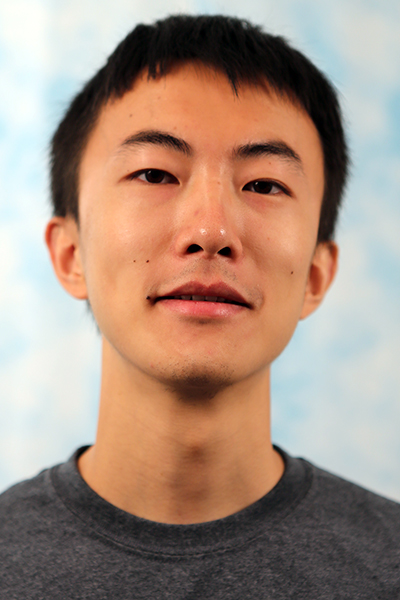Carnegie Mellon University
Gines Hidalgo Martinez – MSR Thesis Talk
Title: OpenPose: Whole-Body Pose Estimation Abstract: We present the first single-network approach for 2D whole-body (body, face, hand, and foot) pose estimation, capable of detecting an arbitrary number of people from in-the-wild images. Our method maintains constant real-time performance regardless of the number of people in the image. This network is trained in a [...]
RI Faculty Social
All Robotics Institute faculty are invited to attend this informal team-building business/social event. Beverages and snacks will be provided.
Donglai Xiang – MSR Thesis Talk
Title: Monocular Total Capture: Pose Face, Body, and Hands in the Wild Abstract: We present the first method to capture the 3D total motion of a target person from a monocular view input. Given an image or a monocular video, our method reconstructs the motion from body, face, and fingers represented by a 3D deformable [...]
Carnegie Mellon University
Wentao Yuan – MSR Thesis Talk
Title: 3D Shape Completion and Canonical Pose Estimation with Structured Neural Networks Abstract: 3D point cloud is an efficient and flexible representation of 3D structures and the raw output of many 3D sensors. Recently, neural networks operating on point clouds have shown superior performance on various 3D understanding tasks, thanks to their power to [...]
Carnegie Mellon University
Planning under Uncertainty with Multiple Heuristics
Abstract: Many robotic tasks, such as mobile manipulation, often require interaction with unstructured environments and are subject to imperfect sensing and actuation. This brings substantial uncertainty into the problems. Reasoning under this uncertainty can provide higher level of robustness but is computationally significantly more challenging. More specifically, sequential decision making under motion and sensing uncertainty [...]
Rawal Khirodkar – MSR Thesis Talk
Title: Leveraging Simulation for Computer Vision Abstract: A large amount of labeled data is required to train deep neural networks. The process of data annotation on such a large scale is expensive and time-consuming. A promising alternative in this regard is to use simulation to generate labeled synthetic data. However, a network trained solely [...]
Carnegie Mellon University
Dexterous Manipulation via Simple Robot Hands
Abstract: Most of the industrial robotic applications nowadays can only deal with pick-and-place manipulation, in which fixed graspings are the only interactions between the object and the robot hand. Simple hands, such as pinch grippers and suction cups, suffice to accomplish such tasks. However, there exist many unsolved automation problems where more dexterous manipulations are [...]
Carnegie Mellon University
Maximilian Sieb – MSR Thesis Talk
Title: Visual Imitation Learning for Robot Manipulation Abstract: Imitation learning has been successfully applied to solve a variety of tasks in complex domains where an explicit reward function is not available. However, most imitation learning methods require access to the robot's actions during demonstration. This stands in a stark contrast to how we [...]
Carnegie Mellon University
Enabling Role-Reversible Human-Robot Interaction by Leveraging Standardized Tools for Provider-Receiver Interactions
Abstract: Developing 'social intelligence' for assistive robots to seamlessly interact with humans remains an open research challenge. However, socially assistive robots typically engage in types of interactions that already exist between humans, which makes models of human-human interactions useful to inform the design of robot social behaviors. In particular, in applications such as healthcare, therapy [...]
Carnegie Mellon University
Nikhil Jog – MSR Thesis Talk
Title: Highly Miniaturized Robots for Inspection of Small Nuclear Piping Abstract: Bomb making in the 20th century resulted in the creation of massive facilities to produce Uranium. As part of a multi-billion-dollar agenda, the measurement of radioactivity is required for the safe disposal of residual Uranium in piping. Manual techniques have proven too approximate, [...]
Carnegie Mellon University
Contrastive View Predictive Learning with 3D-Bottlenecked RNNs
Abstract: In this talk, I will describe our recent work on neural architectures for visual recognition, which use 3D not as input nor as the desired output space, but rather as the bottleneck of the learned representations. We consider embodied agents moving in otherwise static worlds equipped with these architectures; they learn 3D visual feature [...]
Chao Cao – MSR Thesis Talk
Title: Topological Path Planning for Mobile Robot Applications Abstract: Many path planning problems in mobile robot applications can be solved more efficiently in the topological space. By using the language of topology, the richer spatial information failed to captured by graph/grid-based map representations can be explicitly expressed and exploited. With that, it is possible [...]
Carnegie Mellon University
MSR Thesis Talk – Tao Chen
Title: Deep Reinforcement Learning with Prior Knowledge Abstract: Deep reinforcement learning has been applied to many domains from computer games, natural language processing, recommendation systems to robotics. While model-free reinforcement learning algorithms are promising approaches to learning policies without knowledge of the system dynamics, they usually require much more data. In this thesis, we [...]
Carnegie Mellon University
Towards Understanding and Mitigating Biases
Abstract: There are many problems in real life that involve collecting and aggregating evaluation from people, such as conference peer review and peer grading. In this thesis, we consider multiple sources of biases that may arise in this process: (1) human bias -- the data collected from people are noisy and reflect people's calibration criteria [...]
Toward Intent Recognition through Nonverbal Behaviors in Assistive Co-Manipulation
Abstract: Robots are becoming more versatile, increasing the available opportunities to use them in situations that aid people in everyday tasks. For example, recent research has investigated robot manipulators for assisting people with motor impairments in activities of daily living such as eating a meal. To form successful collaborations in these interactions, researchers need to [...]
Carnegie Mellon University
Anqi Yang – MSR Thesis Talk
Title: 3D Object Detection from CT Scans using a Slice-and-fuse Approach Abstract: Automatic object detection in 3D X-ray Computed Tomography imagery has recently gained research attention due to its promising applications in aviation baggage screening. The huge dimension of an individual 3D scan, however, poses formidable computational challenges when coupled with deep 3D convolutional [...]
Carnegie Mellon University
Tian Ye – MSR Thesis Talk
Title: Interpretable Intuitive Physics Model Abstract: Humans have a remarkable ability to use physical commonsense and predict the effect of collisions. But do they understand the underlying factors? Can they predict if the underlying factors have changed? Interestingly, in most cases humans can predict the effects of similar collisions with different conditions such as changes [...]
Carnegie Mellon University
Rotational Distributions for Pose Estimation
Abstract: For robots to operate robustly in the real world, they should be aware of their uncertainty, particularly when estimating the position and orientation, or pose, of objects. This uncertainty can be caused by many factors, such as occlusions, poor lighting, or object symmetry. These factors can naturally induce an inherent ambiguity in terms of [...]

















